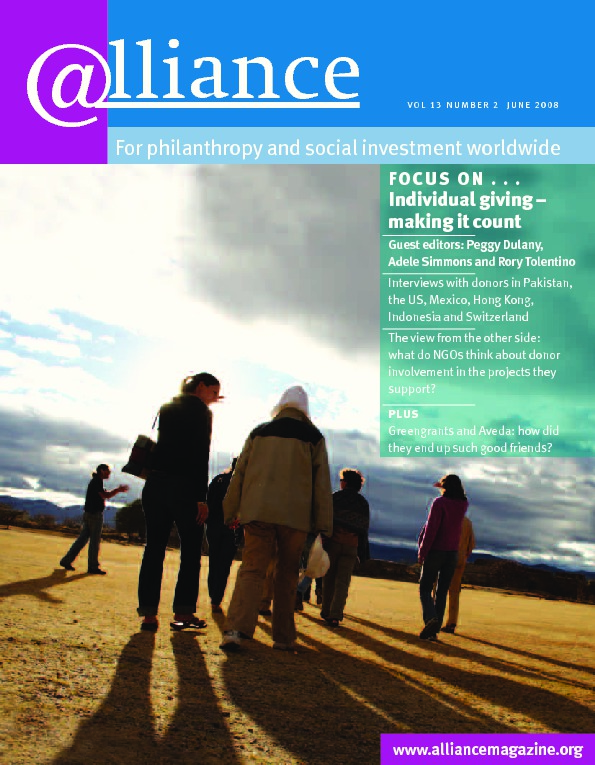The internet is revolutionizing philanthropy. Or at least that was what we thought a year ago at Keystone when we set out to study online philanthropy marketplaces. Our findings show a more nuanced picture, however. While the potential is definitely there, it’s not yet being fully realized.
Online philanthropy markets like GiveIndia, GlobalGiving, Kiva or HelpArgentina, where individuals can shop around for projects and organizations to give or lend to, are a rapidly expanding phenomenon. Our study looked at 24 online markets based in 11 countries to examine their potential to become effective vehicles for sustainable development by enabling donors to make investment decisions on the basis of credible information about what organizations are actually achieving. The flows of information and direct links between different actors offer a great opportunity for increased learning and accountability.
Online philanthropy markets are innovative in five main ways:
They challenge traditional concepts of philanthropy by prompting individual donors to think in terms of ‘social investment’ rather than charity. A pioneer is Brazil’s Social Stock Exchange, which introduced stock market language for individual donations.
They permit every donor to access a report on how their money was used – something that markets like GlobalGiving and GiveIndia pride themselves on. They are usually self-reported qualitative descriptions of how donations were spent and activities carried out, sometimes accompanied by photos and/or video.
They use Web 2.0 applications, like online social networking, to actively engage with donors (see Changing the Present’s Facebook application, or Network for Good’s Six Degrees).
They create communities of people around causes they believe in. Devoted readers of Wildlife Direct’s Gorilla Protection blog provide park rangers with UN reports of ongoing violence in parts of Congo, thus adding to their on-the-ground intelligence.
Finally, they link social investors to beneficiaries, probably the most promising innovation. MyC4, an online microfinance marketplace, serves as a platform not only for channelling investments to businesses in developing countries but also for transferring experience and expertise from social investors to business owners.
There is a long way to go, however. These innovations are still at an early stage and are not applied on a large scale. In addition, while most of the markets claim good results for their projects, they offer little convincing evidence of this. Some of the markets are seriously promoting performance and impact reporting for the projects they list and are committed to giving voice to the people affected by their work. A very small proportion (14 per cent) undertake formal evaluations that include consultations with beneficiaries. Overall, the quality of reporting remains poor and barely incorporates the voices of beneficiaries and other stakeholders.
Collectively, the markets are held back by the lack of a common definition of performance, the belief that donors are not interested in performance data, and the fear that too much talk about effectiveness may alienate both donors and projects. All this despite 78 per cent of them stating that it is part of their remit to publish a measurement of the performance of the projects they list, and listed organizations telling us that participating in an online philanthropy market provides them with an incentive for demonstrating their performance, because of the wide public exposure and competitive setting.
Our study makes three recommendations to help markets realize their transformative potential. They should:
actively promote a ‘social investment mindset’ where the emphasis is on the lasting social value being created;
create a ‘marketplace of ideas’, a space for mutual learning and information and data exchange among markets;
develop a common reporting framework that will focus on contributing to sustainable change and include the voices of beneficiaries and other constituents.
We do not claim to have the solution. But it’s a start.
Natalia Kiryttopoulou is Adviser and Research Associate at Keystone. Email Natalia@KeystoneAccountability.org
For more information
To download the report Online Philanthropy Markets: From feel-good giving to effective social investing? visit http://www.KeystoneAccountability.org/node/159






Comments (0)